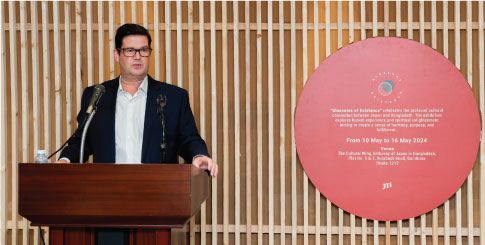- info@ficci.org.bd
- |
- +880248814801, +880248814802
- Contact Us
- |
- Become a Member
- |
- |
- |
- |
- |

As a company deeply invested in Bangladesh, and as a major employer and taxpayer, we firmly believe that open dialogue between the government and businesses is essential for addressing challenges and seizing opportunities to contribute to the country's sustainable development.
We welcome the government's call for a transparent public discussion on long-standing issues within the business environment-challenges that we, along with many others, have faced firsthand. We appreciate Foreign Investors' Chamber of Commerce and Industries (FICCI) for providing a platform for this dialogue. Together, we hope to find solutions that will ensure a better future for the country and its people.
JT Group acquired the tobacco business of Akij Group in Bangladesh in late 2018 for around BDT 124.3 billion (USD 1,476 million) leading to the establishment of JT International Bangladesh Ltd. - making it the single largest private FDI in the history of Bangladesh.
 I am deeply familiar with the business environment in Bangladesh since July 2022, when I arrived in Dhaka to lead our business. While the challenges that businesses, including our company, have been facing in the country are not unique, there are certain areas that need immediate attention.
I am deeply familiar with the business environment in Bangladesh since July 2022, when I arrived in Dhaka to lead our business. While the challenges that businesses, including our company, have been facing in the country are not unique, there are certain areas that need immediate attention.
Unbalanced tobacco regulation that includes a system of excessive rules and requirements together with several layers of decision-making process slow down business operations, stifle innovation, and deter investment. From our experience, obtaining permits and approvals repeatedly means dealing with a tangled web of conditions that complicates the operating environment.
A crucial part of addressing this challenge is to include businesses in discussions about improvements of the operating environment. I believe that our expertise, knowledge, and experience are essential for making regulation evidence-based and more efficient. When internationally accepted better regulation principles are properly implemented, they benefit all stakeholders the state, businesses, consumers, and society at large.
Our experiences with the legal system have highlighted several areas that need attention. We share common goals with regulators: protecting the rule of law, defending the interests of consumers, ensuring a level playing field, and protecting the rights of law-abiding businesses. Currently, the slow pace of the judiciary often creates uncertainty and risks for businesses making it difficult to enforce contracts and resolve disputes. In our view, expediting court proceedings could be an important step to provide the stability and predictability businesses need to operate effectively.

I firmly believe that closer cooperation with the business community with honest dialogue can greatly benefit the country and its economy. Focusing on real challenges and improving the operating environment are crucial to attract more FDI, which brings with it technology, expertise, enhanced employee skills, and best practices in regulatory compliance. In the agricultural sector, foreign investments mean better use of land, higher yields, fewer hazardous chemicals, and decreased pollution. Foreign investment in Bangladesh is a vital component in the efforts to grow and diversify exports.

Addressing bureaucratic challenges, balancing the tax system, and strengthening the legal framework with thoughtful and decisive actions will pave the way for a more resilient and dynamic business environment. We are optimistic that with the right steps, Bangladesh can further unlock its economic potential and create a thriving landscape for businesses.





